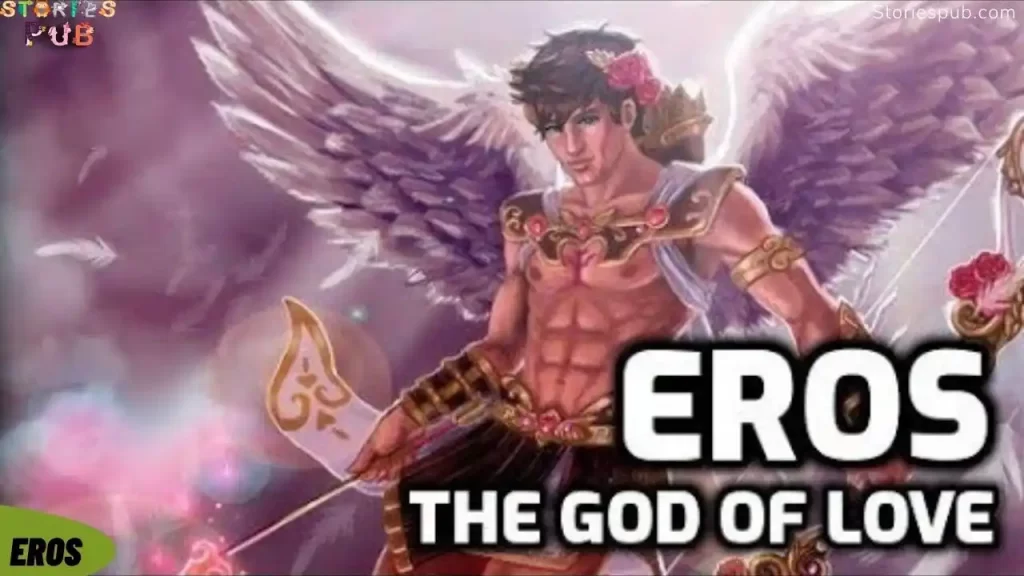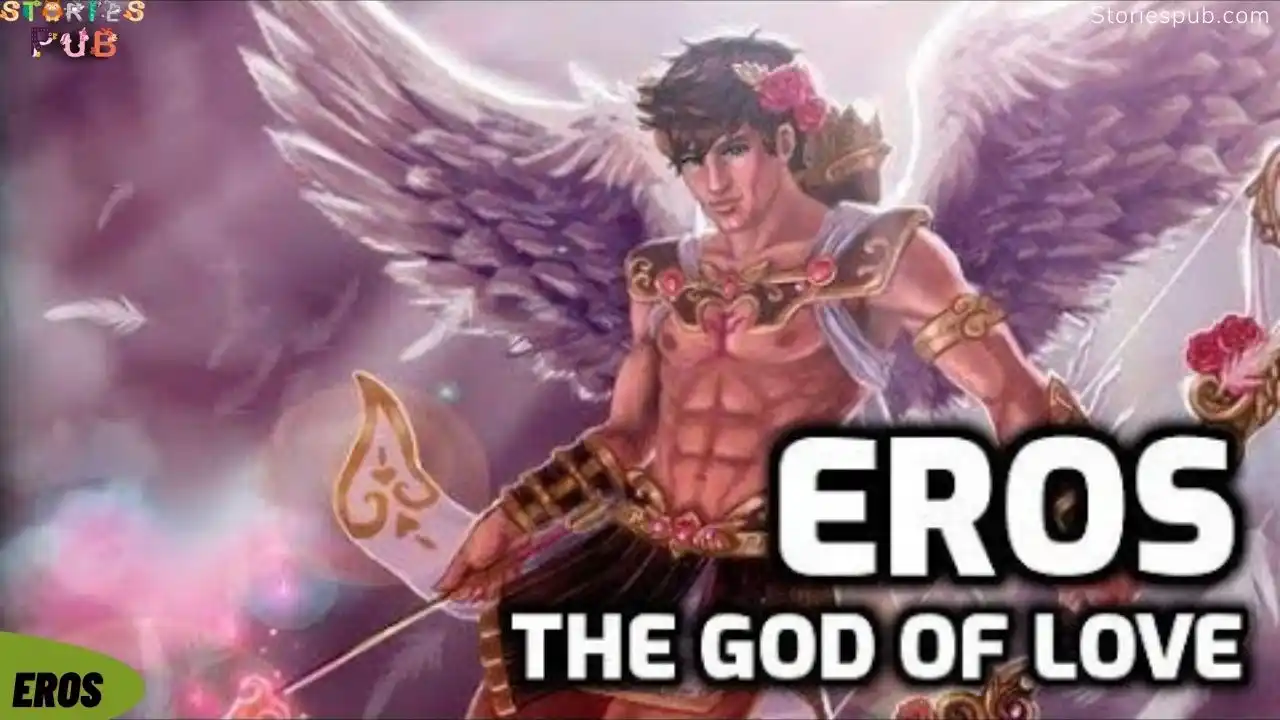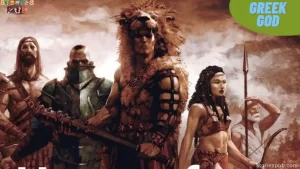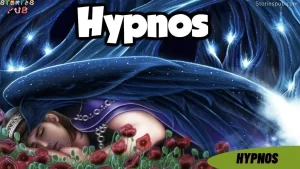Eros, God of Love and Desire: Mythology, Symbolism, and Stories

Eros is one of the most well-known gods in Greek mythology, often referred to as the god of love and desire. In Roman mythology, he is also called Cupid, and the way he has been shown in art and books has made him a well-known figure all over the world.
In Greek mythology, Eros is the son of Aphrodite, the goddess of love, and Ares, the god of war. So, Eros is sometimes shown as a strong young man with wings and a bow and arrows, which he uses to shoot arrows into the hearts of people and gods to make them fall in love.
You also would like to read Mighty Poseidon
Eros’ significance in Greek mythology lies in his ability to create love and desire in others. He is often invoked by mortals seeking love or seeking to rekindle their love for a current partner. His power is so great that other gods occasionally request his assistance in matters of the heart.
While Eros is typically seen as a benevolent figure, his power can also be dangerous. He is known to be capricious and can cause chaos when he is not appeased. This is especially true when he is shown as the god of war, because then he is connected to the more destructive parts of love, like jealousy and getting even.
You also would like to read Athena Greek virgin goddess
Despite his dual nature, Eros remains an important figure in Greek mythology and continues to capture the imagination of people around the world. His influence can be seen in everything from literature and art to modern-day popular culture, where he continues to be a beloved symbol of love and romance.
Eros’ parents and birth
Eros is the son of Aphrodite, the goddess of love, and Ares, the god of war. His birth story varies depending on the source, but there are several versions of how he came to be.
One version of Eros’ birth story states that he was born out of chaos, emerging from the void at the beginning of time. In this version, Eros is seen as a primordial force of love that existed even before the gods.
Another version of Eros’ birth story involves his parents, Aphrodite and Ares. According to this version, Eros was born when Aphrodite, who was married to the smith god Hephaestus, fell in love with Ares. Eros was the product of their illicit affair, and his birth was kept secret from the other gods.
You also would like to read Nyx Greek Goddess
In some versions of the story, Eros is also said to have had siblings, including the goddesses Harmonia and Anteros. Anteros is sometimes shown as the twin of Eros. He is the god of love that is returned, while Eros is the god of love that is not returned.
Meaning of Eros, and his symbol
Eros is perhaps best known as the Greek god of love and desire. As such, he is often depicted in art and literature as a beautiful, winged youth with a bow and arrows, which he uses to inspire love and desire in mortals and gods alike. But beyond this iconic image, Eros also carries deeper meanings and symbolism that have been explored throughout history.
One of the key themes associated with Eros is the idea of love as a powerful and sometimes dangerous force. In mythology and literature, Eros is often shown as a mischievous and capricious figure, capable of causing chaos and disruption in the lives of those he touches. At the same time, he is also seen as a beautiful and inspiring figure, capable of creating great joy and happiness.
You also would like to read God of Messages Hermes
Eros is also associated with the ideas of passion and desire. His arrows are said to be imbued with magical power that can inspire intense feelings of love and desire in those they strike. This has led to Eros being seen as a symbol of both physical and emotional passion, as well as the creative force that drives people to pursue their goals and dreams.
In addition to his role as a god of love and desire, Eros is also associated with beauty and aesthetics. In many depictions, he is shown as a beautiful and idealised figure, reflecting the Greek ideal of physical beauty. This has led to Eros being seen as a symbol of aesthetic perfection and the pursuit of beauty in all its forms.
You also would like to read Medusa
Overall, the meaning and symbolism of Eros are multifaceted, reflecting the complex and often contradictory nature of love and desire. From his role as a mischievous and unpredictable god to his association with passion, beauty, and aesthetics, Eros continues to inspire and intrigue people around the world.
Eros’ Wife
In Greek mythology, Eros is not typically associated with a wife. Instead, he is often shown as a youthful and carefree figure who is more interested in inspiring love and desire than in settling down with a single partner. However, there are a few stories and legends that suggest that Eros may have been involved with other gods and mortals at various times.
You also would like to read Greek God Pan
One of the most famous love stories involving Eros is that of Eros and Psyche. In this story, Psyche is a mortal woman who is so beautiful that people begin to worship her instead of Aphrodite. Out of jealousy, Aphrodite sends Eros to make Psyche fall in love with a monster. However, Eros falls in love with Psyche himself and takes her away to a secret palace. Although they are deeply in love, Psyche is not allowed to see Eros’ face, and this leads to a series of trials and challenges that they must overcome before they can be reunited.
While Psyche is not technically Eros’ wife, she is often seen as his closest companion and lover in mythology. Together, they represent the power of love and the struggle to find happiness in the face of adversity. Their story has been used as a powerful example of how love lasts for a long time by many artists and writers over the years.
You also would like to read Mythological Creatures in ancient Greek
Other stories suggest that Eros may have been involved with other gods and goddesses, such as the goddess Iris, who was known for her beauty and grace. However, these stories are less well-known and have not played as significant a role in mythology as the story of Eros and Psyche.
Eros’ love interests
Eros is a god of love and desire, so it’s not surprising that he has been associated with many love interests in Greek mythology. Some of these love interests are other gods and goddesses, while others are mortals who caught his eye. Here are some of the most famous love interests of Eros:
Psyche: As mentioned earlier, Psyche is perhaps Eros’ most famous love interest. She is a mortal woman who becomes the object of Eros’ affections, and together they overcome many obstacles to be together.
Aphrodite: Eros is often shown as the son of Aphrodite, the goddess of love, and it is said that he inherited his power of desire from her. However, there are also stories that suggest that Eros and Aphrodite had a romantic relationship at some point.
Zeus: In some versions of Greek mythology, Eros is said to be the son of Zeus and Aphrodite, which would make him the half-brother of other major gods such as Apollo and Hermes.
Apollo: According to some stories, Eros caused Apollo to fall in love with Daphne, a nymph who was devoted to Artemis. This caused a lot of drama and conflict between the gods, ultimately leading to Daphne being turned into a tree to escape Apollo’s advances.
Persephone: Eros played a role in the famous story of Hades and Persephone, in which Hades abducts Persephone and takes her to the Underworld. Eros is said to have shot Hades with one of his arrows to make him fall in love with Persephone in the first place.
Helen of Troy: In some versions of the Trojan War myth, Eros is said to have shot Helen with one of his arrows to make her fall in love with Paris, thus starting the war.
Eros’ Power and Significance
Eros is a Greek god of love and desire, and he is associated with the power to cause intense emotions in others. According to myth, Eros has the ability to shoot arrows of desire, which can cause the target to fall in love or become obsessed with someone else. This power makes Eros a significant figure in Greek mythology, as he is often depicted as a mischievous god who causes chaos and disruption with his arrows.
You also would like to read Aeneas: The Hero of Troy
Eros’ arrows are not just a tool for causing romantic love but also for instilling desire in general. This desire can be for anything from material possessions to power and influence, and it is said that Eros’ arrows can make people do things they wouldn’t normally do. As a result, Eros is often seen as a god of temptation and seduction who can easily manipulate people to do his bidding.
Despite his reputation as a troublemaker, Eros is also seen as a positive force in Greek mythology, as love and desire are important parts of the human experience. Eros is often associated with the idea of erotic or passionate love that involves a physical and emotional connection between two people. In this way, Eros is seen as a god who can bring people together and create a powerful bond between them.
You also would like to read Zagreus: The Prince of the Dead
Eros’ power and significance can be seen in many aspects of Greek culture, from art and literature to religious practice. Eros was often depicted in ancient Greek art, such as sculptures and pottery, where he was shown as a winged figure with a bow and arrows. In ancient Greek poetry and drama, Eros was a popular subject. He was often portrayed as a god who was up to no good and caused trouble.
Eros’ enemies and weaknesses
Eros had his share of enemies in Greek mythology. One of the best-known stories involving Eros’ enemies is the tale of his betrayal by his own mother, Aphrodite. In this story, Eros is portrayed as a mischievous god who causes trouble for his mother by shooting his arrows of desire at anyone he pleases. Aphrodite, who is furious with her son for his actions, decides to exact revenge on him by ordering him to shoot an arrow at the nymph Psyche, which would make her fall in love with a monster.
You also would like to read Mighty Hecatoncheires
Eros, however, falls in love with Psyche himself and decides to keep her for himself. He hides her away in a secret palace and visits her only at night, but he warns her not to look at him. Despite his warning, Psyche becomes curious and shines a lamp on him one night, causing Eros to flee in anger. In the end, Eros forgives Psyche and makes her his eternal wife, but the story shows how tense and difficult things were between him and his mother.
Another weakness of Eros is his blindness, which was said to be caused by a vengeful Apollo. In one story, Apollo becomes angry with Eros for shooting him with an arrow of desire, and he retaliates by shooting Eros with a golden arrow of truth and a lead arrow of falsehood. The result is that Eros becomes blinded, unable to see who he is shooting his arrows at. This weakness is important because it shows that even a powerful god like Eros is not invincible and can be hurt by what other people do.
Eros’ Children
Eros had a number of children in Greek mythology. While not as well-known as some of the other figures in Greek mythology, his children played important roles in various stories and legends.
One of Eros’ most famous children was Himeros, who was known as the god of sexual desire and was often depicted as a young man holding a torch. Another of his children was Anteros, who was the god of reciprocal love and was often depicted as a handsome youth armed with arrows. Anteros was seen as a symbol of the dangers of unrequited love because he would shoot arrows at people who didn’t love them back.
Another of Eros’ children was Pothos, who was the god of longing and yearning. He was often depicted as a young man holding a bow and arrow and was associated with the idea of unfulfilled desire. Pothos was said to be particularly fond of Aphrodite, Eros’ mother, and was often depicted alongside her in works of art and literature.
You also would like to read Tales of Ancient Greek Heroes
In addition to these well-known children, Eros was also said to have fathered a number of other figures in Greek mythology, including Hedone, the goddess of pleasure, and Peitho, the goddess of persuasion. These kids show how Eros is linked to desire, passion, and all the different feelings and experiences that come from them.
Eros’ famous wars
Eros is not typically associated with wars and conflicts in Greek mythology. However, there are a few notable stories in which Eros plays a role in battles and conflicts.
One of the most famous stories involving Eros and a conflict is the tale of Apollo and Daphne. In this story, Apollo, the god of music, poetry, and prophecy, is struck by one of Eros’ arrows and falls madly in love with Daphne, a nymph who is not interested in his advances. To escape Apollo’s pursuit, Daphne pleads with her father, the river god Peneus, to help her. He turns her into a laurel tree, but Apollo continues to love her even in this form and makes the laurel his sacred tree.
Another famous story involving Eros is the tale of the Trojan War. In this epic conflict, Eros is said to have played a role in the fall of the city of Troy. According to some versions of the story, it was Eros who caused Helen, the wife of King Menelaus of Sparta, to fall in love with Paris, the prince of Troy. This led to a long and bloody conflict between the Greeks and the Trojans, ultimately resulting in the destruction of Troy.
You also would like to read List of Greek God
While these stories do not involve Eros as a warrior or fighter, they illustrate the ways in which his power and influence could impact the lives of those around him. Eros was often seen as a force of passion and desire, and his actions could have far-reaching consequences, even leading to conflicts and wars between nations. These stories serve as a reminder of the power of love and desire and the ways in which they can shape the course of human history.
Eros’ Appearance and Symbols
Eros is often depicted in art and literature as a young, handsome god with wings and a bow and arrow. He is typically shown as a youthful figure with golden hair and rosy cheeks, often depicted with a playful expression on his face. His wings and bow and arrow are key symbols associated with him.
The wings are a reminder of his ability to fly and are often depicted as small and delicate, with feathers in shades of white, pink, or gold. They represent the swiftness and lightness of love, as well as the way in which Eros can move quickly and easily between different people and places.
You also would like to read List of Greek Goddesses
The bow and arrow are perhaps the most well-known symbols associated with Eros. The bow represents his power to create desire, while the arrow represents the means by which he can transmit that desire to others. According to legend, the arrowheads of Eros’ arrows were made of precious metals like gold, silver, and lead, each with different effects on those they struck.
In some depictions, Eros is shown wearing a quiver of arrows, indicating his readiness to spread desire and love wherever he goes. He may also be shown holding a torch, which represents the flame of passion and desire that he ignites in others.
Overall, Eros’ appearance and symbols reflect his power and influence as a god of love and desire. Through his wings and bow and arrow, he is able to move swiftly and create powerful feelings of attraction and passion in others. People still recognise his symbols as symbols of love and desire, which are feelings that everyone has.
Famous Myths and Stories about Eros
Here are some of the best-known myths and stories about Eros:
The Story of Apollo and Daphne: In this myth, Eros is responsible for causing Apollo, the god of music and poetry, to fall in love with Daphne, a nymph who had no interest in him. Eros had shot Apollo with one of his arrows, which caused Apollo to become obsessed with Daphne. But Daphne, who had been shot with a different kind of arrow that caused her to reject love and desire, had no interest in Apollo. In the end, she was turned into a laurel tree, and Apollo created a wreath from her leaves to wear as a symbol of his love.
You also would like to read Zeus the king of God
The Love Story of Eros and Psyche: This is perhaps the most well-known myth about Eros. In this story, Eros falls in love with a mortal woman named Psyche, but he keeps his identity a secret from her. They eventually marry, but Psyche becomes curious about her husband’s true identity, and she lights a lamp to look at him while he’s sleeping. In doing so, she accidentally burns him with hot oil, and he leaves her. Psyche then embarks on a quest to prove her love for Eros, and eventually, they are reunited and live happily ever after.
The Story of Eros and Aphrodite: In this myth, Eros is the son of Aphrodite, the goddess of love and beauty. Eros is often depicted as a mischievous child in this story, causing trouble for his mother and others. In one tale, Eros tries to shoot a golden arrow at his mother, but he accidentally shoots himself with a leaden arrow, causing him to fall in love with a mortal woman. In another story, Eros helps his mother trick the god Hephaestus into releasing her from a trap he had set for her.
The Tale of Adonis: Eros also appears in the story of Adonis, a handsome mortal man who becomes the object of desire for both Aphrodite and Persephone, the queen of the underworld. Eros is to blame for Aphrodite falling in love with Adonis, but he is also to blame for Adonis dying too soon.
Eros’ Importance and Responsibility in Greek Mythology
Eros was an important god with a significant role in the lives of mortals and other gods. Eros was known as the god of love and desire, and his main responsibility was to bring people together through his power of attraction. Eros was seen as an important god because he could bring people together in romantic and sexual love, which was seen as an important part of human life.
As the god of love and desire, Eros was responsible for creating and sustaining the bond between couples. Eros was believed to be responsible for the passion and intensity that come with love, and without him, love and relationships would be dull and lifeless. Also, people thought that Eros was the reason for many important relationships in Greek mythology, like the marriages of Hera and Zeus and Aphrodite and Hephaestus.
Eros was also important in mythology because he was considered the child of Aphrodite, the goddess of beauty, love, and sexuality. Aphrodite was one of the most important goddesses in Greek mythology, and her relationship with Eros reinforced her position as a powerful deity. Eros was seen as an extension of Aphrodite’s powers, and together they were believed to control the realm of love and sexuality.
Conclusion
In conclusion, Eros is a complex and significant figure in Greek mythology. He is the god of love, desire, and attraction and is often depicted as a winged young boy armed with a bow and arrow. Eros’ parentage, birth, and appearance are sources of great interest and debate, as are his love interests, enemies, and children.
Eros is an important figure in Greek mythology due to his role in bringing love and desire to both gods and mortals. His power and importance as a god can’t be overstated, and people have been drawing and writing about him for hundreds of years.
Despite his often playful and mischievous nature, Eros also has a darker side, including enemies and weaknesses that have been the subject of many myths and stories. Still, Eros is an important and lasting figure in Greek mythology, and his legacy continues to affect art, literature, and culture around the world.
Hey kids, how much did you like Eros, God of Love and Desire: Mythology, Symbolism, and Stories? Please share your view in the comment box. Also, please share this story with your friends on social media so they can also enjoy it, and for more such stories, please bookmark storiespub.com.
Check out other stories that we have:





